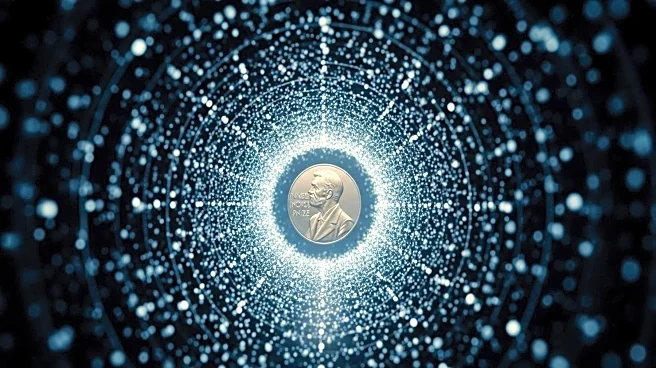What's Happening?
John Clarke, Michel H. Devoret, and John M. Martinis have been awarded the Nobel Prize in Physics for their groundbreaking research into quantum mechanical tunneling. Clarke conducted his research at the University of California, Berkeley, while Martinis worked at the University of California, Santa Barbara, and Devoret at Yale and the University of California, Santa Barbara. Their work has laid the foundation for advancements in quantum computing, cryptography, and sensors. Clarke expressed surprise at the win and highlighted the significance of their contributions to digital technology, noting that quantum mechanics underpins all digital advancements.
Why It's Important?
The recognition of Clarke, Devoret, and Martinis underscores the critical role of quantum mechanics in modern technology. Their discoveries are pivotal for the development of quantum computing, which promises to revolutionize industries by enabling faster and more secure data processing. The laureates' work could lead to significant advancements in fields such as cryptography, enhancing data security, and quantum sensors, improving precision in various applications. This award highlights the ongoing importance of fundamental scientific research in driving technological innovation and economic growth.
What's Next?
Following the announcement, the Nobel Prize in Chemistry is set to be revealed on Wednesday, with literature on Thursday and the Nobel Peace Prize on Friday. The Nobel Memorial Prize in Economics will be announced on October 13. The award ceremony will take place on December 10, commemorating the anniversary of Alfred Nobel's death. The laureates will receive a cash award of 11 million Swedish kronor, approximately $1.2 million, along with the prestigious recognition.
Beyond the Headlines
The award not only celebrates the scientific achievements of the laureates but also highlights the enduring relevance of quantum mechanics in technological advancements. As quantum technology continues to evolve, ethical considerations regarding its application, particularly in areas like cryptography and computing, will become increasingly important. The recognition of these scientists may inspire further research and investment in quantum technologies, potentially leading to transformative changes in various sectors.










